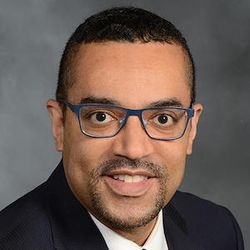
OR WAIT null SECS
Elizabeth Cerceo, MD, on How to Address Health Care’s Impact on Climate Change
Cerceo discusses key topics from her session at the ACP Internal Medicine meeting about health care providers’ role in discussing climate-related health with their patients
The health care industry accounts for approximately 5% of total greenhouse gas and toxic air emissions, coming primarily from the United States and contributing directly to the ongoing climate crisis.1
Given the health care sector’s notable contributions to climate change, mitigation and adaptation efforts fall heavily on physicians and key stakeholders, a topic Elizabeth Cerceo, MD, associate internal medicine program director and director of environmental health in the division of hospital medicine at Cooper University Health Care, discussed in her session at the 2024 American College of Physicians (ACP) Internal Medicine Meeting in Boston.
Specifically, she referenced the importance of leveraging direct patient education, noting “Health care providers, health care professionals, whether it's nurses, physicians, we are all very trusted messengers by the public, so when they hear a message that comes from us about climate-related health factors or impacts of climate change, they will listen to us much more than they'll listen to politicians or other places where they may be hearing messages.”
Although Cerceo described how physicians generally like to be fully educated on a topic before they discuss it with their patients, she said the strength of the current data should make health care providers feel “empowered” and like opening up that conversation will ultimately benefit the patient, regardless of how up-to-date you are on the most recent climate-related information.
Beyond ensuring that physicians themselves are educated on climate change and its link to health care, Cerceo also emphasized the importance of educating trainees and perhaps other physicians who may not yet be aware of or well-versed on the health consequences associated with climate change.
“New research is coming down the pipe fast and furious,” she added. “We're seeing studies where you can demonstrate the path of physiologic linkages. We don't just have correlation, association studies anymore, but we have that more foundational data that shows that these are real effects that are happening, and we can demonstrate why.”
Despite the mounting body of evidence supporting the growing climate crisis, Cerceo explained that patients’ receptiveness toward climate-related topics when discussing their health tends to depend on how the conversation is framed. Beyond counseling her patients on the need to be careful about their exposure to certain environmental factors like air pollution, she also described the importance of providing them with tangible things they should be doing or a linkage that appeals to their direct experiences.
Although Cerceo described the expansion of the conversation and research surrounding climate change as “encouraging,” she was also careful to note that it is not enough, saying “Things really need to accelerate, and we need to keep our foot on the gas pedal. Now is not the time to sit back and think, oh, you know, there's been a few positive steps, let's rest on our accolades… It has to be all physicians recognizing the inter-linkages between us and our environment, and that we need to be mindful of this and incorporating it into our daily practice.”
Reference:
1. Eckelman MJ, Huang K, Lagasse R, et al. Health Care Pollution And Public Health Damage In The United States: An Update. Health Affairs. https://doi.org/10.1377/hlthaff.2020.01247
Related Content:

